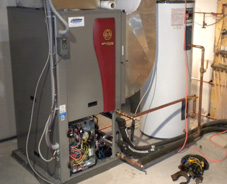Kevin and Margot Scrim from Dunrobin have a 2600 sq ft bungalow with walk-out basement. The house is unique in that it is entirely built of cement (ICF) and is heated primarily with radiant floor heating thoughout the entire house. In addition, they had a backup forced air furnace. They had an on-demand water heater/boiler, that supplied the radiant heat as well as domestic hot water.
Kevin and Margot are very environmentally conscious and wanted to make a substantial reduction in fossil fuel use (propane). They spent 2 years investigating alternatives including solar (ground and roof mount) and geothermal. As their heating system was unique, they had a hard time finding a geothermal company that could integrate with their existing equipment and provide heating and cooling, as well as hot water.
They contacted every geothermal company they could find and had a frustrating experience. Some wouldn't respond to calls, some would repond but wouldn't come for a site visit even though they said they would call back. Some visited the site but provided such complex and contradictory information that it was hard to understand. Alternative solutions were proposed but nobody had a concrete proposal. Enter John Barton.
"John took the time to explain in a language we could understand", says Kevin. "He followed up on our detailed questions and proposed a solution that was designed to fit our needs. "
End result: A vertical closed loop system with two - three hundred ft deep bore holes was installed on the front lawn. The Scrim's chose the location for minimal disruption to the extensive landscaping, as well as proximity to the house. A Water Furnace Synergy 3 was installed along with a buffer tank to integrate to the radiant heating system. The Water Furnace also provides cooling in the summer and a portion of the domestic hot water. The use of propane for heating has been completely eliminated with an anticipated net annual savings of $1000. (savings of propane less increased hydro to run the furnace) Most importantly, they will decrease their fossil fuel useage of over 3000 litres of propane annually.





